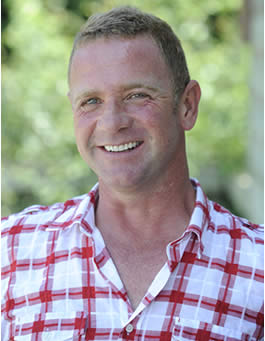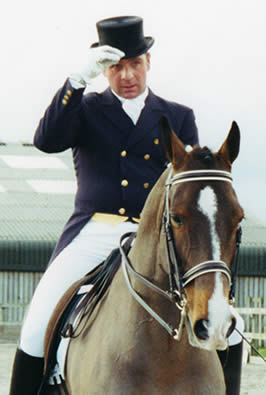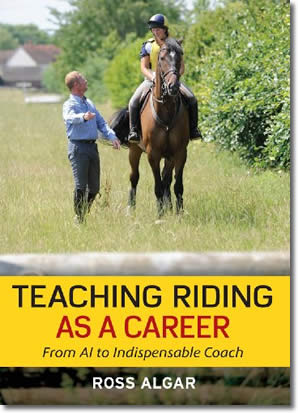 From the age of four, Ross Algar wanted to ride. At 19-years-old
he wanted to join the army. Having spent, as he says “12
glorious years” in the Army, he then wanted to become
an instructor and an author. The result: he has just published
his first book, Teaching Riding as a Career.-From A1 to
Indispensable Coach.
From the age of four, Ross Algar wanted to ride. At 19-years-old
he wanted to join the army. Having spent, as he says “12
glorious years” in the Army, he then wanted to become
an instructor and an author. The result: he has just published
his first book, Teaching Riding as a Career.-From A1 to
Indispensable Coach.
Says Ross, “Coming from a non-horsey background and
living in Cherry Hinton, Cambridgeshire, I had not
been exposed to horses except probably with a capital ‘H’ preceding
the word and a picture of an overweight pony as an association,
in a child’s book.
“Then at the age of four my long-suffering grandfather, George Algar,
got pressured by my parents to take me to his allotment one afternoon on our
bikes. Mine still had the stabilisers attached which, much to my cycling partner’s
annoyance, slowed down the proceeding somewhat.
“On route we had to pass a riding school and along a track through a
hole in the hedge I stopped to witness a riding lesson in progress. I was mesmerised
by what I saw, so much so that as soon as we got home I pleaded with my parents
to let me have a go.
“From that day forth I was hooked. I was taken under the wing by Miss
Elizabeth Pickard, who owned the local riding school. She taught me to ride.
Miss P was a stickler for professionalism and at that age had a big affect
on me that has stood me in good stead throughout my life. I was one of the
lucky ones to have crossed her path and will forever be indebted to her.”
By the time Ross was eight years old, he had
completed his first one-day event. He went on to
represent his local pony club in both pony club eventing
and dressage
Championships. He even competed his own horses in affiliated
events.
“My parents, Bob and Shirley, have supported me throughout
my career and still do. Now living in the village of Bourn
they even bought extra land to allow me to have my own horses
at home when I reached my teens”
When he was 19, Ross announced that he wanted to join the
army.
My father,” he says, “ was full of glee and my
mother was left sobbing “.
He joined The King’s Troop Royal Horse Artillery. He
took part in ................
In 1987 when he was 27 he was posted to The Army School
of Equitation at Melton Mowbray as an instructor of 'potential
instructors'. For two-years he was responsible for
teaching potential instructors from all the three armed services.
“It was exciting teaching people to teach,” he
says. “It gave me a much deeper understanding of how
best to teach a variety of different people and realise the
importance of becoming adaptable as an instructor”.
What makes the Army such a good place for training riders?
 Says Ross, “The Army has a self sufficient system that
is second to none. Horses, grooms, instructors, farriers,
saddlers, tailors, vets, stables, cross country courses,
lots of land to ride on. Everything is at your disposal.
The opportunities are immense and the help you get is very
professional. Not only are you taught to teach military style
you are encouraged to teach civilian style too and the Army
teaching qualifications are run parallel to the BHS ones.
Apart from the excellent teaching programme you have an opportunity
to ride in civilian competitions as well as military ones.
Says Ross, “The Army has a self sufficient system that
is second to none. Horses, grooms, instructors, farriers,
saddlers, tailors, vets, stables, cross country courses,
lots of land to ride on. Everything is at your disposal.
The opportunities are immense and the help you get is very
professional. Not only are you taught to teach military style
you are encouraged to teach civilian style too and the Army
teaching qualifications are run parallel to the BHS ones.
Apart from the excellent teaching programme you have an opportunity
to ride in civilian competitions as well as military ones.
“As a rider I have enjoyed much success up
to advanced level in both dressage and eventing. I
have also competed successfully abroad at international level
dressage, giving me a more world-wide understanding
of equestrian techniques.
“One of the most influential times for me was
when I trained and competed in Texas with the western
riders learning to ride and train American Quarter Horses.
The American Quarter Horse is uniquely suited to western
riding but what a lot of people don’t realise is that
they are good at most equine disciplines. They are used for
driving, polo, racing and endurance riding. I was lucky to
have the offer of eventing one in England. He was bought
off the race track in Kentucky and was highly suited to his
new job.
“Not many people can say they have ridden an
ex racehorse from India through the Nepalese Himalayas but
I have. When I was posted out there to train horses
at the Ghurkha Regiment in Dharan, Nepal I did just
that experiencing yet another culture in the world of horses.
“The big difference between our approach to horses
and the Ghurkhas’ approach was not much different.
They loved their horses as much as we do as also they are
sometimes the only means of transport for many Nepalese that
live in the hills. I can remember we had to post a man out
in the field to keep a watch out for bears when the horses
where grazing as they would push the fence down and try to
go for the horses. A little different to here!”
The time was coming when he would decide to leave the army.
“Having served twelve glorious years learning more
about horses and how to teach, I was scared at the
thought of standing in front of a group of students having
to deliver a perfect lesson,” he says.
“It took me quite a while to get the hang of it but then I realised that
I was educating others and getting them interested in what I had grown a deep
passion for. Could I see a way of making a living out of my hobby? Well I was
getting good results and pleasing feedback so I decided to try and go it alone.
The decision was made and I would leave the Army to pursue a career as a freelance
riding instructor.”
At first, he admits, he was nervous.
“Leaving the security of the forces was scary at the time but I decided
to put the word around that I was now in the Berkshire area and was available
to teach. Very soon I was inundated with new clients all wanting lessons. I
worked seven days a week and became very popular. I got so busy that there
were not enough hours in the day.
“I’ve been very lucky throughout my career. I have always somehow
managed to be in the right place at the right time. One day I met a client
who was an editor for a national horse magazine. I was talking to her about
my life so far, who I had met and what I had achieved. She thought it would
be a good idea if I wrote an article.
 “It was published a month later and that is where
I got the bug to write. She suggested that I start to write
a book on the subject making it autobiographical which I
promptly did.
“It was published a month later and that is where
I got the bug to write. She suggested that I start to write
a book on the subject making it autobiographical which I
promptly did.
“On meeting another new client who had written equine
based books I showed it to her and she was impressed enough
to suggest I should find a publisher. J.A.Allen came to the
rescue and offered me a contract. ‘TEACHING RIDING
AS A CAREER’ is the title they chose and it has already
got great feedback from people who have read it already.
“I have competed at advanced level both in Eventing
and Dressage, I have trained a few National Dressage riders
and even helped one of my clients win the World Championship
in single horse carriage driving. But writing is my latest
challenge and I hope that it will help budding riding instructors
have a clearer picture about the job and for all the current
instructors to help them maintain or improve their businesses.”
Having achieved so much so quickly, does he had any other
challenges ahead of him?
“I still have that buzz every day of being able to
help people with their horses and help riding instructors
get the best out of their jobs too. Maybe it’s being
able to do my hobby every day and be able to make a good
living from it which fills me with passion still!”
A happy man. Thanks to horses.
Buy the book here
